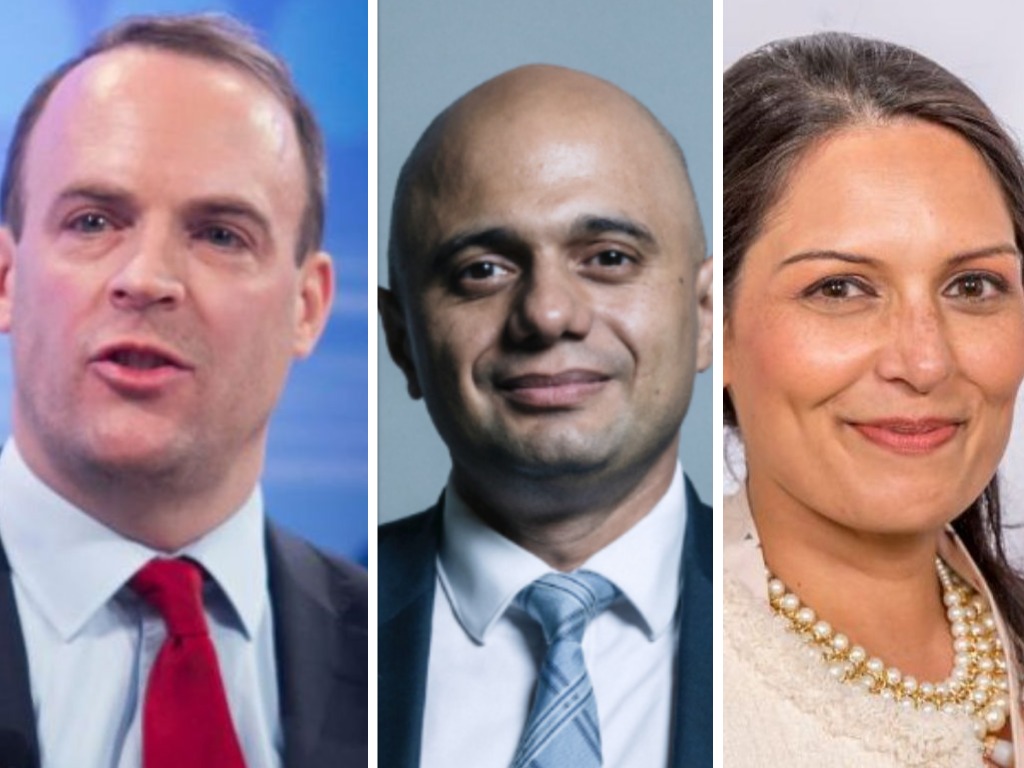Boris Johnson has officially stepped into the role of Prime Minister and is assembling his Cabinet.
Johnson on Wednesday (24 July 2019) sacked more than half of the Cabinet formed by Theresa May, with many new faces anticipated to enter in his administration.
RightsInfo has examined the new PM’s mixed track-record on human rights – but how does the rest of his team stack up?
*We will update this story as ministers are announced.*
Sajid Javid, Chancellor
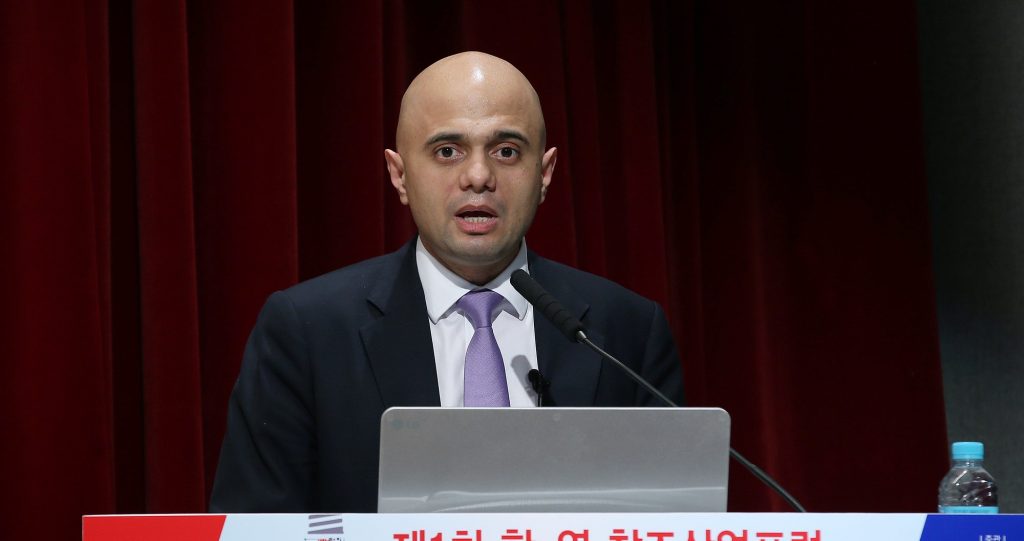
Image Credit: Flickr / Republic of Korea.
The former Home Secretary, who was promoted to the role in April last year, has been appointed as Chancellor of the Exchequer.
The Conservative MP from Bromsgrove was among the many who entered the Tory leadership race, making it through to the final four candidates.
While still in the running, he bounced all of his rivals into a commitment to an external investigation into Islamophobia within his party during a televised debate.
Sajid Javid asks leadership rivals to commit to an external investigation into Islamophobia in the Tory party, saying people are "right to have concerns about growing anti-Muslim hatred in our country"
Live updates: https://t.co/sYMtjZRym7 #BBCOurNextPM pic.twitter.com/Tocf4V0uKz
— BBC Politics (@BBCPolitics) June 18, 2019
His predecessor, Amber Rudd, was forced to resign due to the ongoing fallout from the Windrush Scandal, where thousands of people who arrived in the UK legally were threatened with deportation.
In a statement released shortly after taking up his new post, Javid said: “I end by making one thing crystal clear: we will do right by the Windrush generation”.
He set up a dedicated taskforce to handle the cases of those affected and regularise their status in the UK, to ensure they have the necessary citizenship documents.
A compensation scheme was also set up to give payments to those who suffered emotional distress or unemployment as a result of the scandal.
In July last year, he also hinted that he would consider ending the indefinite detention of immigrants following a damning report by former prisons ombudsman Stephen Shaw.
“My ultimate goal is to ensure that our immigration system – including our approach to detention – is effective and humane,” Javid told the Guardian.
However, Javid made headline news in February when he decided to strip east London 19-year-old Shamima Begum of her British citizenship following her decision to join terrorist group ISIS in Syria as a jihadi bride.
International law forbids nations from making people stateless by revoking their citizenship.
He did so hoping that Bangladesh would accept her as a citizen on the count of her parents heritage – but it did not. Stuck in a Syrian refugee camp, the teenager’s newborn child died weeks later.
They Work For You indicates that Javid has “generally voted against laws” to promote equality and human rights but voted in favour of equal gay rights.
Priti Patel, Home Secretary
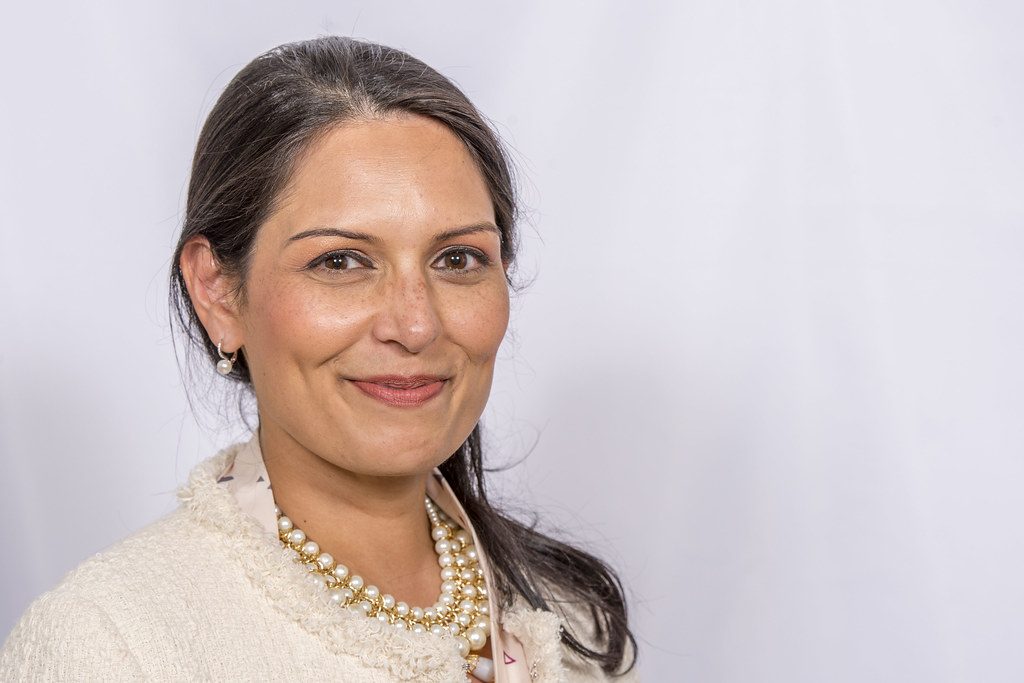
Image Credit: Flickr / Number 10.
Priti Patel served as Secretary of State for International Development between 2016 and 2017 but was forced to resign when it emerged she had secret meetings with senior Israeli officials while on a “family holiday”.
Before entering politics, Patel worked as a lobbyist on behalf of British American Tobacco (BAT), working to improve their image. Part of the negative image Patel was trying to improve stemmed from reports that they paid their factory workers in Myanmar £15 a month, and later that their Nigerian farms employed children.
Since entering politics, Patel has publicly argued that the death penalty is an effective deterrent to crime. She launched a campaign arguing against giving prisoners the right to vote. She has stated that the Human Rights Act is a “glaring example of what is going wrong in our country”.
Patel campaigned to leave the EU. She has generally voted against laws which promote equality and human rights.
Dominic Raab, Foreign Secretary
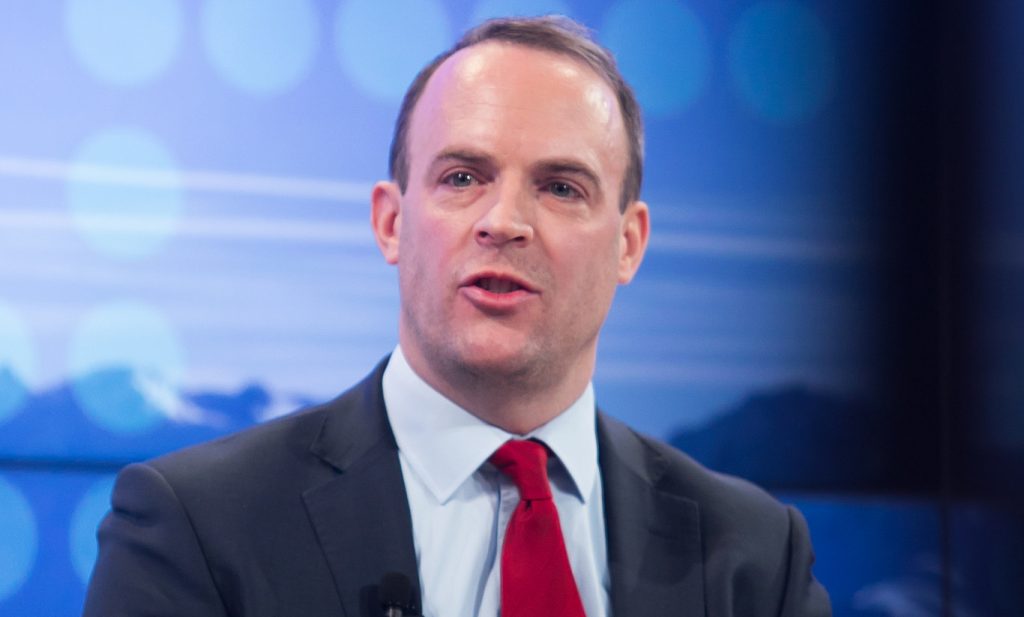
Image Credit: Flickr / World Economic Forum.
Ardent Brexiteer Dominic Raab, the MP for Esher and Walton, resigned as Brexit Secretary in November 2018 after disagreeing with PM May’s deal.
Announcing his resignation on Twitter, he said: “I cannot in good conscience support the terms proposed for our deal with the EU”.
Raab has been an outspoken critic of the Human Rights Act (HRA), the piece of legislation which embeds international human rights protections as part of our laws.
In his previous role as Justice Minister, he masterminded plans to repeal and replace the HRA, claiming that he was worried about the sovereignty of British Parliament and judges, as well as how rights could be expanded.
He also added that he believed the HRA was “rushed” and “flawed”.
In 2011 he said “the tabloids blame everything on the HRA and, in my view, the NGOs think it’s perfect. I think there’s a middle ground. The HRA didn’t do a great deal to protect some of our freedoms – against ID cards, the DNA database, against some of the surveillance where children were followed home from school to check their catchment area”.
He has also been dubious about human rights more generally too, saying they “run riot”, and are “skewed”.
In a Telegraph column, he pointed to a man who could not be deported following a conviction related to the 2011 London Riots, criticising the right to family life for preventing his immediate deportation, saying “Article 8 is being expanded to protect the criminals’ rights not the families” and making human rights a “dirty word”.
He argued the Government should introduce legislation to refuse foreign criminals the right to appeal deportation with their Article 8 rights.
Michael Gove, Chancellor Of The Duchy Of Lancaster
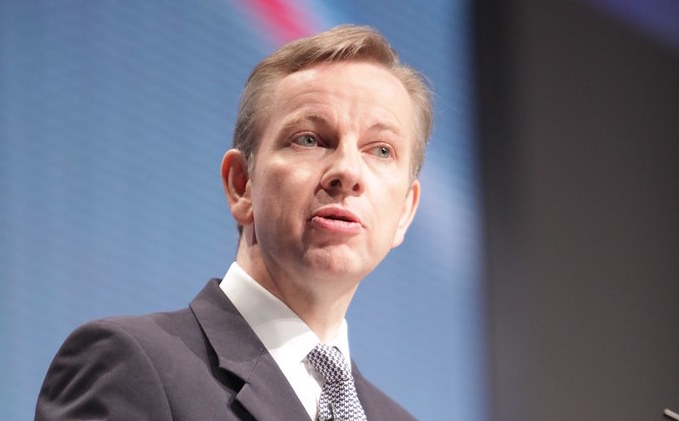
Image Credit: Flickr / Conservatives.
The former Environment Secretary entered Parliament in 2005 and has previously served as Justice Secretary and Education Secretary.
He headed the victorious Vote Leave campaign in 2016 alongside Boris Johnson.
While Justice Secretary, Michael Gove promised to replace the Human Rights Act, which enshrines the Human Rights Convention in UK law, with a British Bill of Rights.
His purported rationale for doing so was to assert the supremacy of domestic judges over the European Court of Human Rights in Strasbourg.
Speaking to a House of Commons committee in February 2016, he said: “Human rights are seen as something that are done to British courts and the British people as a result of foreign intervention rather than being something which we originally championed and created and seek to uphold.
But, in a response from campaigners Liberty, this notion was dismissed as “myth-spreading”.
“The Human Rights Act brought rights home, and allowed British judges to interpret and apply the Human Rights Convention for the first time,” wrote director’s assistant Bella Sankey.
According to They Work For You, Gove has “generally voted against” laws promoting equality and human rights.
He voted against retaining the EU’s Charter of Fundamental Rights – which sets out civil, political, economic and social rights protected by various EU institutions – as part of UK law following Brexit, and he has also voted in favour of repealing the Human Rights Act.
Stephen Barclay, Brexit Secretary
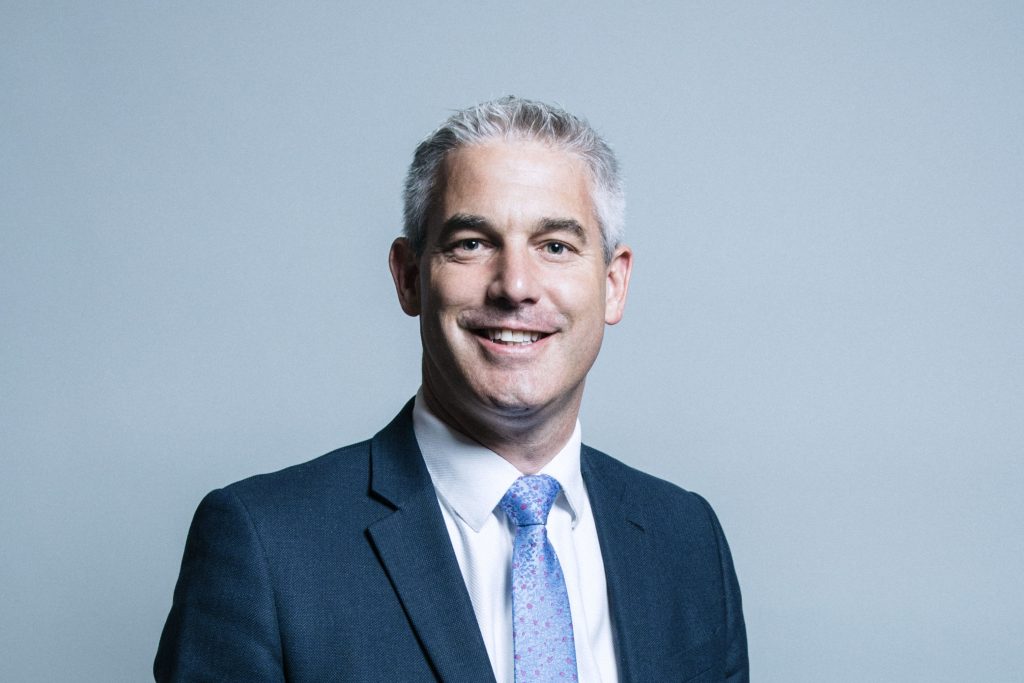
Image Credit: Parliament.uk.
The MP for North East Cambridgeshire retains his job as Brexit Secretary after being appointed in November last year – his first Cabinet job.
He entered into Parliament in 2010 and was promoted to a Government whip under David Cameron in 2015. In this respect, there is less information on his human rights voting record than there is for his some of his peers. Before entering into politics, he worked as a director of Barclays Bank and a financial regulator.
In 2018, he voted in favour of not retaining the EU Charter of Fundamental Rights in UK law following Brexit and in 2012 he voted in favour of repealing the Human Rights Act. He backed gay marriage in 2013 but voted against a backbench bill to legalise assisted dying in 2015.
The Daily Mirror reported in 2013 that he backed the bedroom tax despite asking for £24,226.09 in accommodation expenses.
Elizabeth Truss, International Trade Secretary
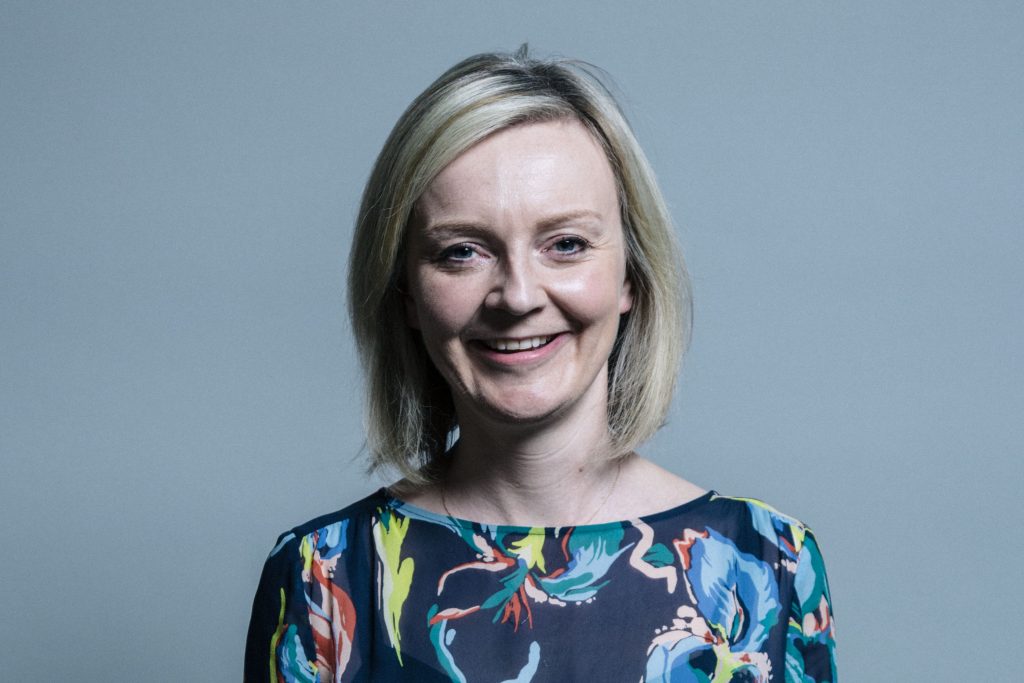
Image Credit: Parliament.uk
Chief Secretary to the Treasury Liz Truss is now the Secretary of State for International Trade and President of the Board of Trade.
She was previously Justice Minister and Lord Chancellor, becoming the first woman to hold this position. She was also the third non-lawyer to hold the role in a row, after Chris Grayling and Michael Gove, although she has been a member of the parliamentary Justice Select Committee since 2011.
The Ministry of Justice is responsible for various law-related matters including human rights and civil liberties.
Following the Queen’s speech in May 2015, Truss said that the Human Rights Act would be replaced with a “British Bill of Rights” because it was a manifesto commitment of the Conservative party. She reaffirmed this commitment again in August the following year in an interview on BBC Radio 4.
She was moved to the Treasury after the 2017 general election, which was widely viewed as a demotion.
Truss voted in favour of gay marriage but also voted to restrict legal aid.
Matt Hancock, Health Secretary
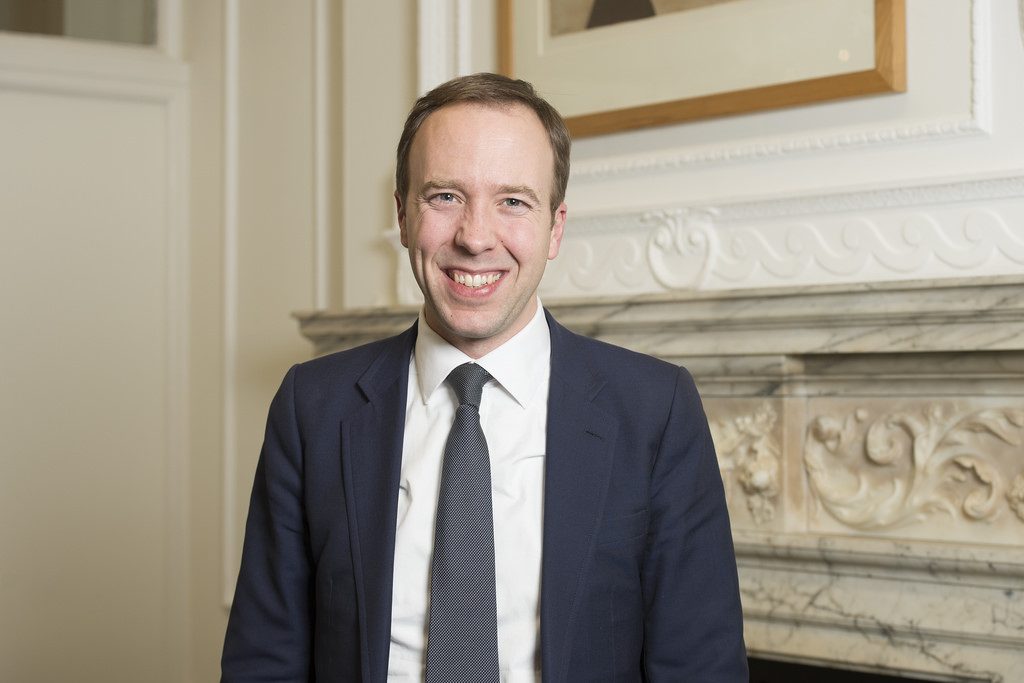
Image Credit: Flickr / Number 10.
Hancock was elected into Parliament in 2010 and appointed Health Secretary in July last year after six months as Culture Secretary.
Before entering into politics he worked as an economist at the Bank of England.
In November, he ordered watchdog the Care Quality Commission (CQC) to conduct an urgent investigation into the practice of locking people with learning disabilities and autism in segregated hospitals indefinitely.
The preliminary findings were published in May, with the deputy chief inspector of hospitals Paul Lelliott saying that urgent action was needed to protect the human rights of the most vulnerable.
In May 2019, a BBC Panorama investigation revealed widespread abuse and “psychological torture” of patients at one such hospital in County Durham.
Hancock accepted the CQC’s recommendations in full, saying: “I hope this is a turning point so everyone receives the care they need.
“I will not let these people down – they deserve better.”
However, speaking to RightsInfo, disabilities campaigner Simone Aspis argued that the recommendations do not go far enough.
“This is a political choice,” she said. “To spend thousands of pounds a week locking people up in institutions – with that money we could provide excellent care in the community.”
According to voting monitor They Work For You, Hancock voted to scrap the Human Rights Act in 2016 and two years later voted against retaining the EU Charter of Fundamental Rights post-Brexit.
Andrea Leadsom, Business Secretary
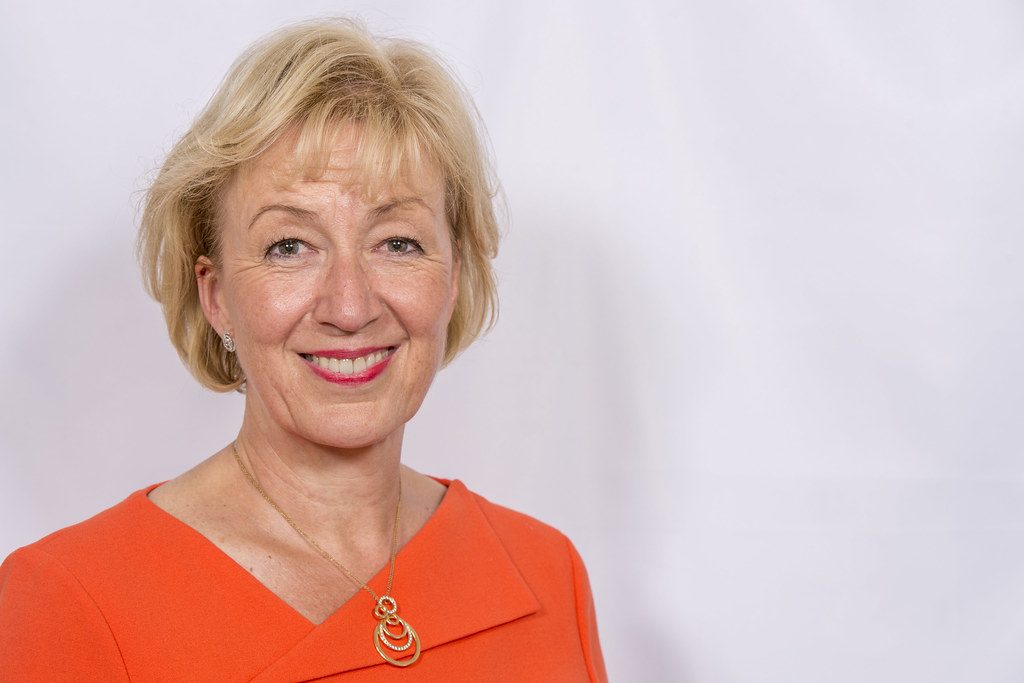
Image Credit: Flickr / Number 10.
Leadsom is a former financial institutions director of Barclays Bank and Conservative activist since university.
She was the last candidate standing against former Prime Minister Theresa May in the 2016 leadership race.
However, Leadsom pulled out of the race after suggesting that having children made her a better choice of candidate. Theresa May and her husband Philip have been unable to have children.
According to TheyWorkForYou, Leadsom has almost always voted against laws to protect human rights and equalities.
In June last year she voted against retaining the EU Charter of Fundamental Rights after exiting the European Union and she has also voted in favour of repealing the Human Rights Act.
She “positively abstained” from the equal marriage vote in 2013.
She said this was because, while she wanted to support gay rights, she could not “vote for a measure that risks centuries of faith based belief in marriage as between a man and a woman”.
Amber Rudd, Work And Pensions Secretary
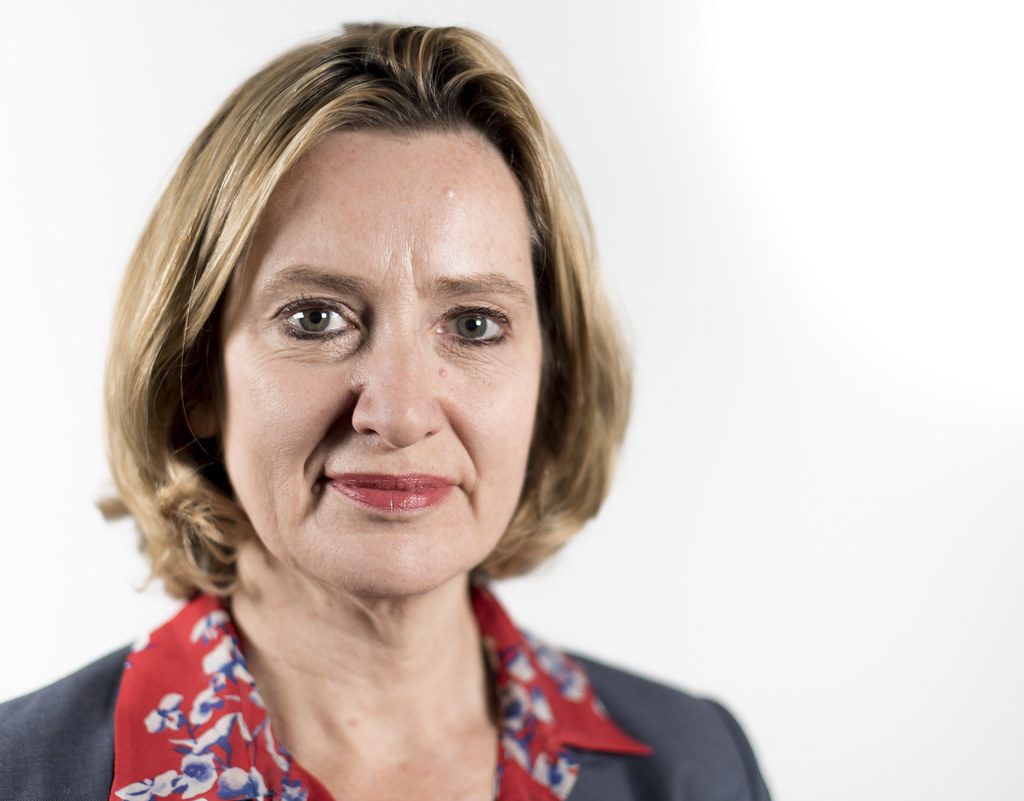
Image Credit: Flickr / Number 10.
Amber Rudd has retained her role as Secretary of State for the Department of Work and Pensions (DWP), to which she was appointed in November last year.
She had previously been appointed as Home Secretary between 2015 and 2016, but was forced to resign due to the ongoing fallout from the Windrush Scandal, where thousands of people who arrived in the UK legally were threatened with deportation.
It also emerged that the Home Office was setting regional targets for removing and deporting undocumented migrants under Rudd’s watch. She denied having any knowledge this when pressed by Labour MP Yvette Cooper during a Home Affairs Select Committee meeting. However, a leaked memo published by the Guardian contradicted her claims. It boasted that her department made progress on “a path towards the 10 percent increased performance on enforced returns, which we promised the home secretary earlier this year”.
Prior to her role in the Home Office, Rudd contributed to the Committee on Equality and Non-Discrimination and was the Chair of the All Party Parliamentary Group on Sex Equality. She actively campaigns for the rights of women, sex equality, and the eradication of female genital mutilation.
According to They Work For You, Rudd has consistently voted in favour of equal rights for gay people, including gay marriage.
Ben Wallace, Defence Secretary
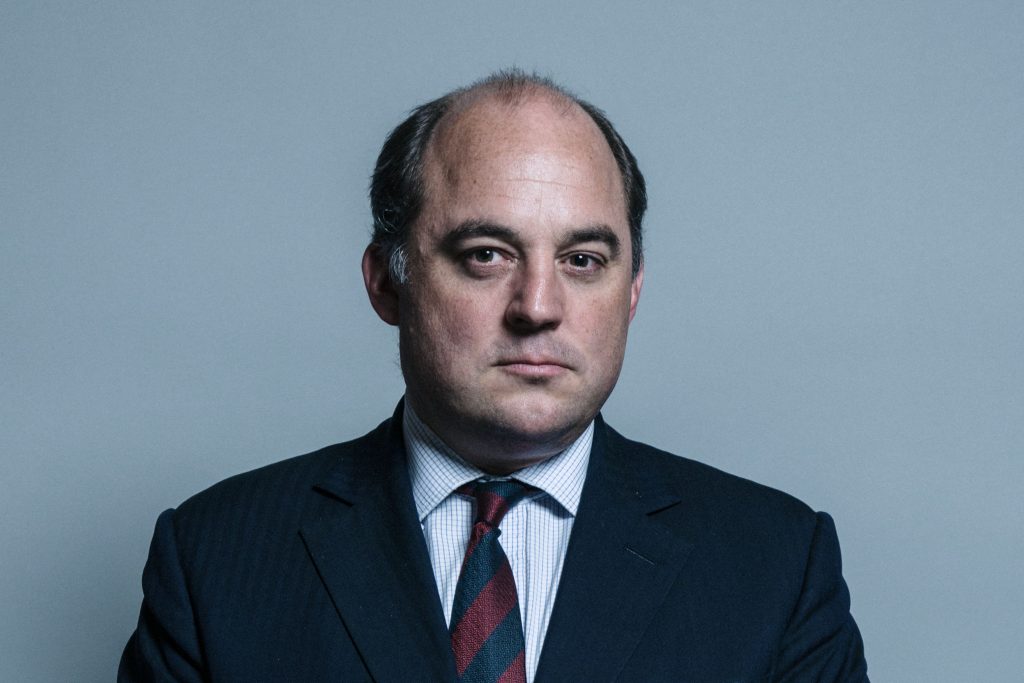
Image Credit: Parliament.uk.
Ben Wallace has been promoted from a junior minister within the Home Office to the Secretary of State for Defence. He had campaigned to remain in the EU, warning that a no-deal Brexit would damage UK-EU security ties, which would have an impact on protecting the public.
Before entering into politics, he served in the Army for eight years. His tours included Northern Ireland, Germany, Cyprus and Central America.
He has consistently voted against same-sex marriage and making same-sex marriage available to armed forced personnel outside the UK in 2014.
While in the Home Office, he was involved in pushing through the Counter Terrorism and Border Security Act, given Royal Assent in February this year. The powers conferred by the Act have been criticised by human rights groups as a “serious abuse of civil liberties”.
The Act has made it a criminal offence to travel to certain areas where the Government designates that it is “necessary, for the purpose of protecting members of the public from a risk of terrorism, to restrict UK nationals and residents from entering, or remaining in”. While he was Home Secretary, Sajid Javid requested that Home Office officials urgently review the case for exercising that power in relation to North Eastern Syria.
Those who enter or remain in a designated area can be jailed for up to 10 years.
Gavin Williamson, Education Secretary
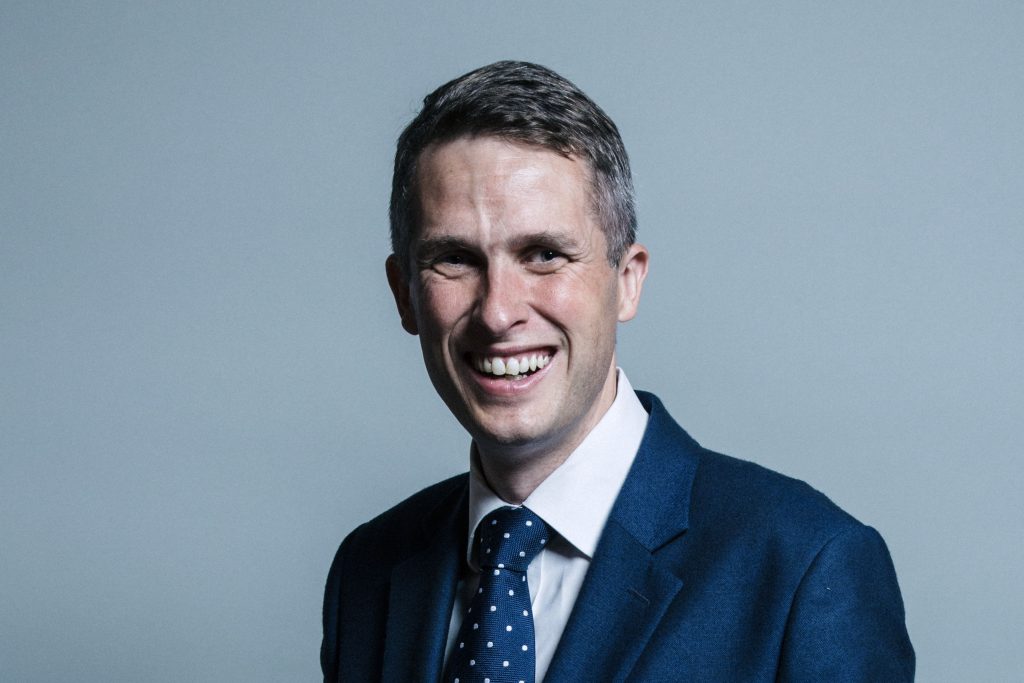
Image Credit: Parliament.uk.
Gavin Williamson has been appointed Education Secretary just weeks after he was sacked as Defence Secretary for allegedly leaking details of a National Security Council meeting.
He has gained a fearsome reputation in Westminster for keeping a pet tarantula called Kronos on his desk.
In April, before being sacked as Defence Secretary, he announced that the Ministry of Defence would establish a £2million Centre of Excellence for Human Security.
The aim of the centre is to provide training to militaries around the world to ensure that bystanders and civilians’ human rights are respected and they are not caught up in conflict.
“In modern warfare there is no ‘front line’ and the sad reality is that innocent bystanders are in harm’s way in conflicts around the world,” he said.
“Protecting civilians from human rights violations is as much a military task as defeating the enemy.”
However, he has also said that the UK should hunt down and kill all British Isis fighters in Syria.
This promotion of extra-judicial killings runs counter to the fundamental right to life, as protected by international human rights conventions, as well as the right to a fair trial, among others.
He has consistently voted against same-sex marriage.
The MP for South Staffordshire has strongly voted in favour of greater school autonomy – always backing more freedoms to support the Government’s academies programme.
Robert Buckland, Justice Secretary
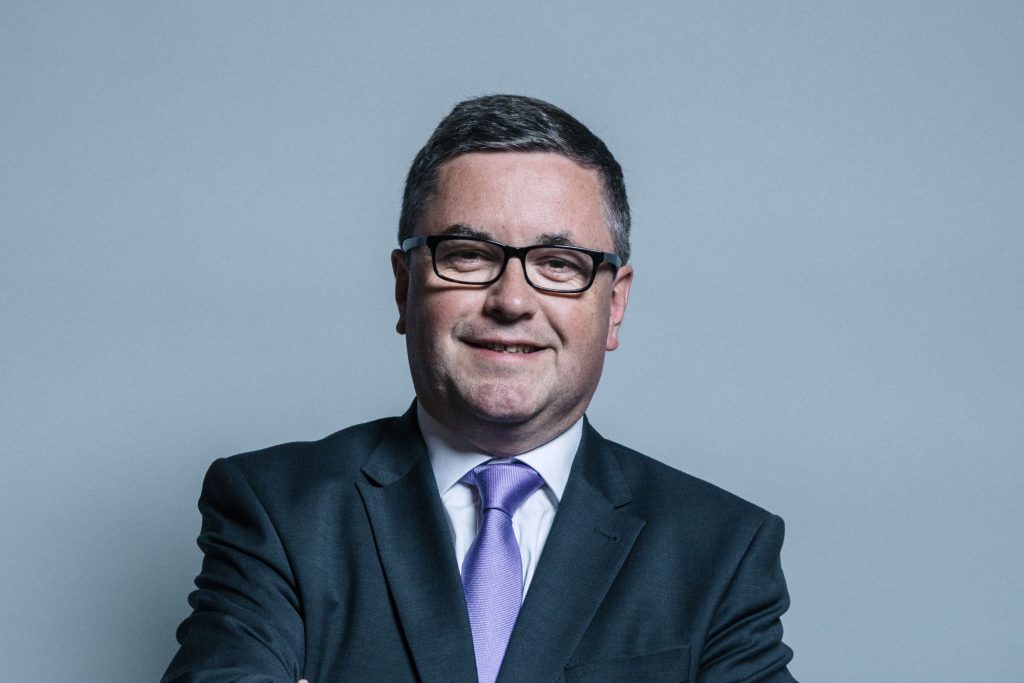
Image Credit: Parliament.UK.
Former Justice Minister Robert Buckland has been promoted to Lord Chancellor and Secretary of State for Justice.
The MP for Swindon South previously worked as a barrister, practising criminal and planning law. He was a strong supporter of remaining in the European Union, although he voted against retaining the EU Charter of fundamental rights following Brexit.
He has also voted in favour scrapping the Human Rights Act in favour of a British Bill of Rights.
In 2011, he reportedly told attendees of a European Parliament-organised event that such a bill would be “all about building on what we’ve got already”, according to the UK Immigration Law Blog.
He added: “More work can be done in light of our organic constitution”.
He has also voted consistently against allowing same-sex couples to marry, telling the Swindon Advertiser in 2013 that he was “disappointed that the bill passed”.
He added: “But I have to accept that a majority voted for the bill and I’m a democrat like anybody else”.
He told the Advertiser: “I believe that marriage is between a man and a woman”.
Theresa Villiers, Environment Secretary
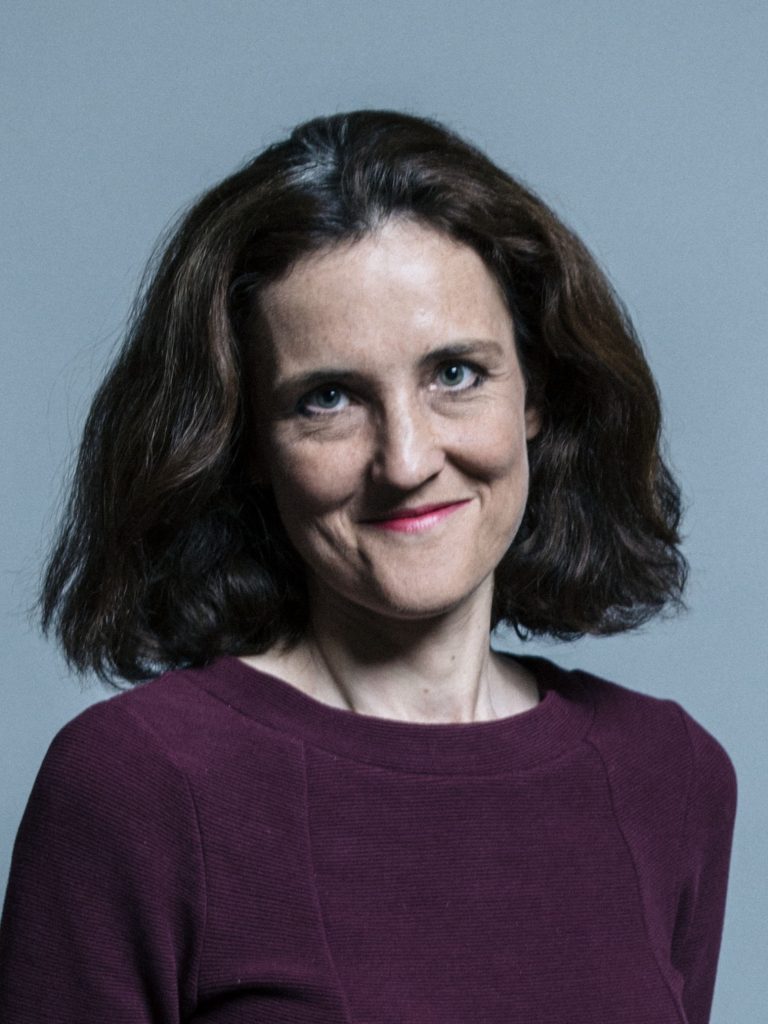
Image Credit: Wikimedia Commons.
The former Northern Ireland Secretary has been moved to the Department for Environment, Food and Rural Affairs.
This department is central in setting the Government’s policies in relation to the worsening climate crisis. UN Special Rapporteur Philip Alston last month warned that this crisis threatens the human rights of the world’s poorest, including those on low-incomes in the UK, unless governments take “drastic action”.
Nevertheless, the Chipping Barnet MP’s voting record on environmental issues is checkered. In 2016, she voted against reducing the permitted carbon dioxide emission rate of new homes. Two years prior, she voted against setting a target range for the UK’s greenhouse gas emissions.
She also voted down a bill that would require companies to obtain an environmental permit to take part in fracking. This controversial method of fuel extraction involves injecting liquid at a high pressure into shale rock in the ground to force open existing fissures, releasing stores of oil and gas.
In 2015, she spoke in favour of scrapping the Human Rights Act and replacing it with a British Bill of Rights, as was pledged in her party’s manifesto. Human rights groups criticised her position, arguing that this would undermine the Human Rights Convention and thereby “breach” Northern Ireland’s peace accord.
“We are going to continue to protect fundamental rights enshrined in the European Convention,” Villiers said, defending the pledge.
“It’s perfectly possible to repeal the Human Rights Act and replace it with a UK Bill of Rights while remaining a signatory to the Convention,” she claimed.
James Cleverly, Party Chairman
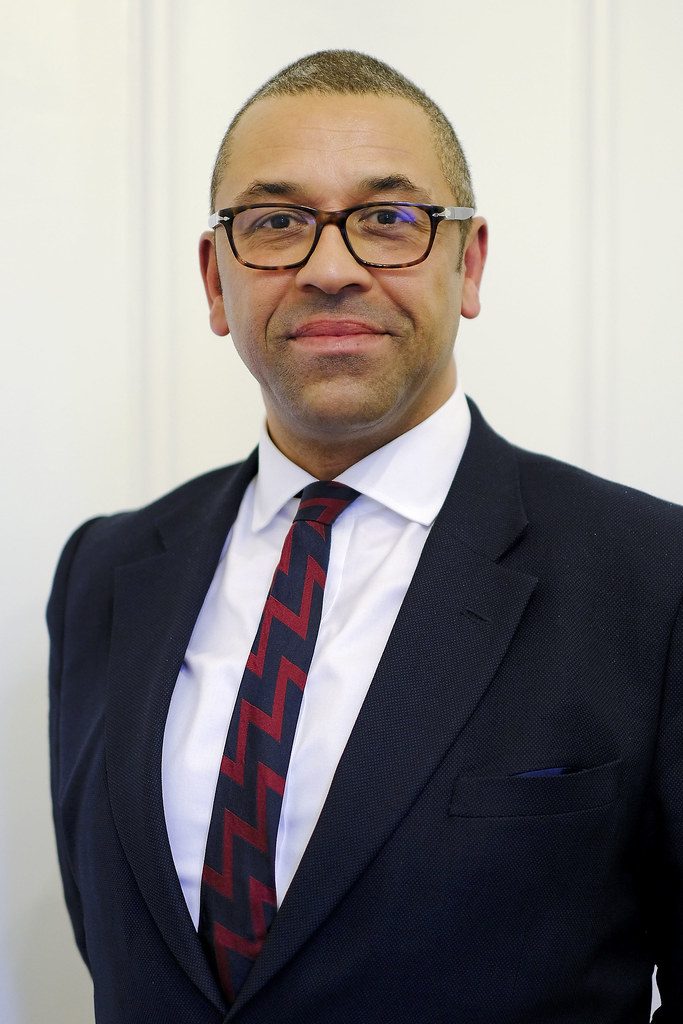
Image Credit: Flickr / Number 10.
James Cleverly was elected as MP for Braintree in 2015 and was appointed as a Brexit minister in April 2019, after serving as the Conservative Party’s deputy chairman.
Having entered into politics relatively recently, his human rights voting record is not as lengthy as others in this list.
In a 2015 episode of BBC’s Daily Politics, joined by Brexiteer Jacob Rees-Mogg, Cleverly defended his party’s manifesto pledge to scrap the Human Rights Act in favour of a British Bill of Rights.
“The idea that in 1996, before the Human Rights Act was brought into legislation, that we lived in some nasty despotic jingoistic nation I think is really quite ridiculous,” he said.
He added: “When British courts come to a judgement that disagrees with a judgement in the European Court [of Human Rights], it is the British court that should be supreme”.
Also on the show was Labour MP for Kilburn Tulip Siddiq, who argued: “I still haven’t heard an answer to what they fundamentally disagree with in the Human Rights Act”.
She added: “For us sitting in this studio, human rights may seem very remote, they might seem very far away, but there are people in this country who rely on those rights”.
In 2017, Cleverly was called on to step down as the patron of a charity supporting disadvantaged people in South East England after voting in favour of cutting Employment and Support Allowance (ESA) – a welfare benefit for disabled people.
Grant Shapps, Transport Secretary
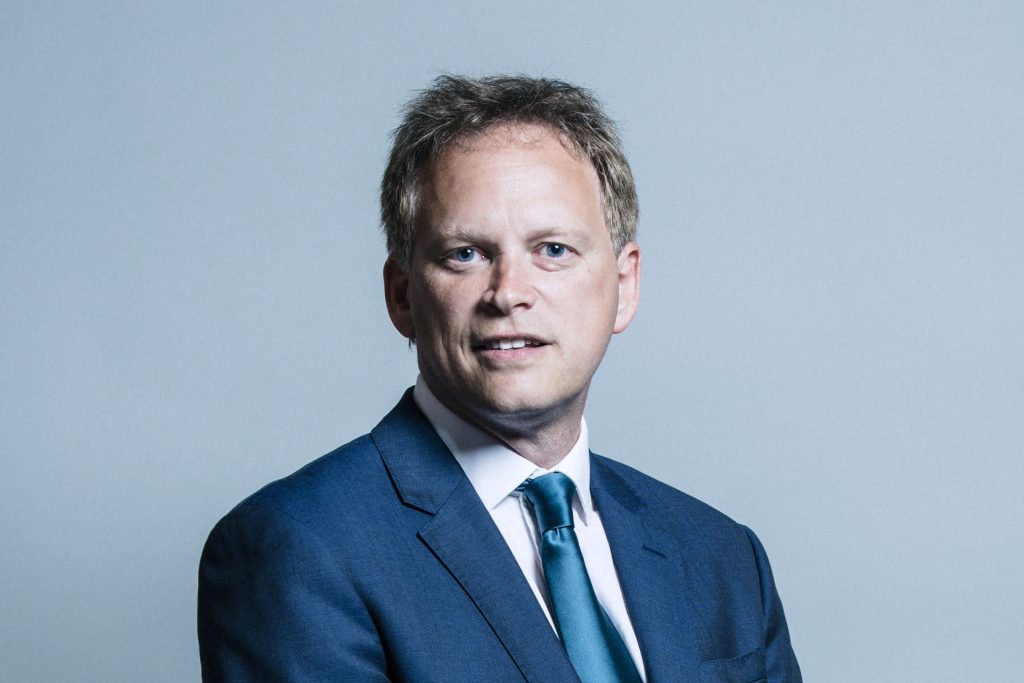
Image Credit: Parliament.uk.
Grant Shapps used to be a minister in the Department for International Development but resigned following allegations he ignored warning about bullying within the Conservative party when he was a co-chairman.
The MP for Welwyn Hatfield originally campaigned to remain in the European Union but said he is now backing Brexit “as hard as you like”. In 2018, he voted against retaining the EU Charter of Fundamental Rights as part of UK law after leaving the European Union. In 2016, he also voted to scrap the Human Rights Act in favour of a British Bill of Rights.
In 2013, as Conservative chairman, he dismissed the United Nations housing expert as “a woman from Brazil” when she criticised his party’s bedroom tax policy. Raquel Rolnik, the UN’s special investigator on housing, said that she was “very shocked to hear how people really feel abused in their human rights by [the bedroom tax]”. The tax reduces housing benefit by 14 percent for those deemed to have a “spare room” and by 25 percent for those deemed to have two or more.
In 2013, he voted in favour of allowing same-sex couples to marry.
Robert Jenrick, Housing And Communities Secretary
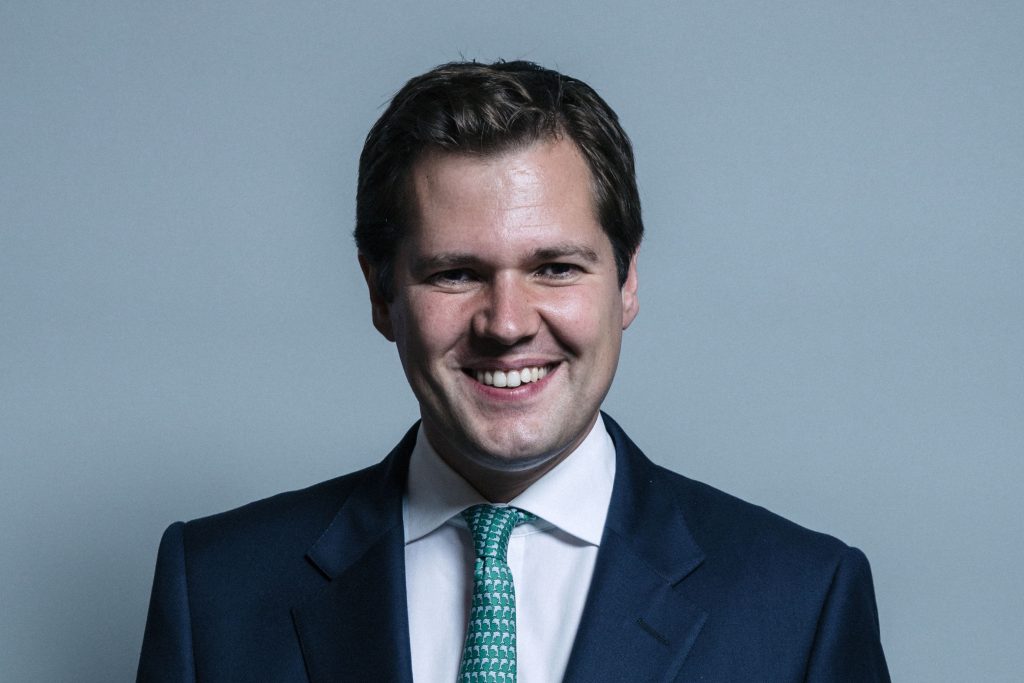
Image Credit: Parliament.uk.
The 37-year-old was elected MP for Newark in a 2014 by-election and has, since January 2018, held a junior ministerial role at the Treasury. He has not had a huge amount of time to build up a human rights voting record, unlike others in this list.
Jenrick is a former corporate solicitor, who worked for international law firm Skadden, and served as Michael Gove’s parliamentary private secretary in the Ministry of Justice. His role was focused on “human rights policy reform,” Legal Cheek reported at the time.
He has voted in line with the Tory whip on repealing the Human Rights Act but also voted in favour of assisted dying for terminally ill people.
As Housing Secretary, he will be tasked with tackling the present housing and homelessness crisis in the UK. In a 2017 column in the Times, he suggested a policy of building homes on new lands and selling them at cost.
In 2014, he received criticism after the Daily Mail reported he and his wife own a £5million property portfolio comprising three homes.
Want to learn more?
- View our human rights video library.
- Check out these human rights infographic posters.
- Read plain English explainers on the Human Rights Convention and the Human Rights Act.
Featured Image Credit: Dominic Raab – Flickr / World Economic Forum. Sajid Javid – Parliament.UK. Priti Patel – Flickr / Number 10.

